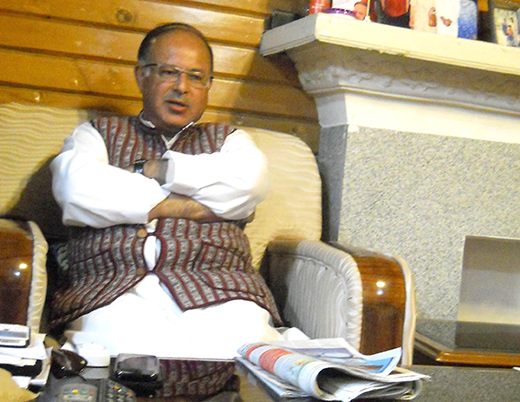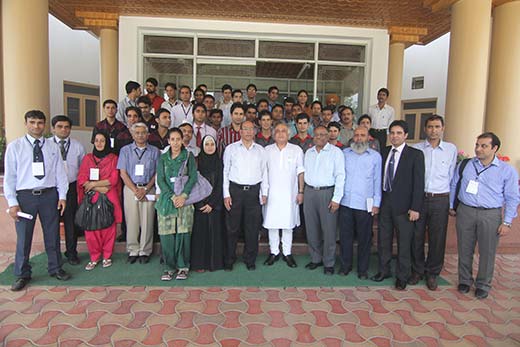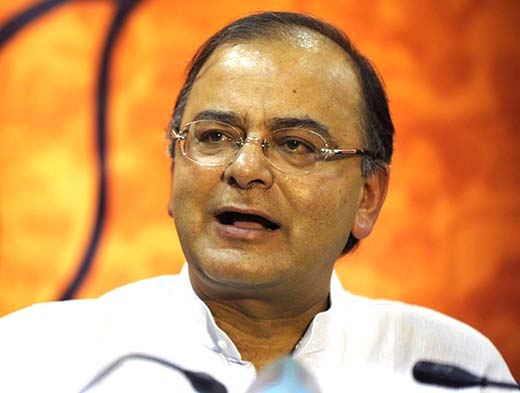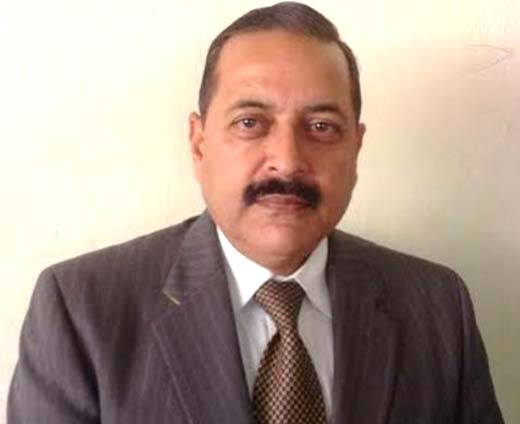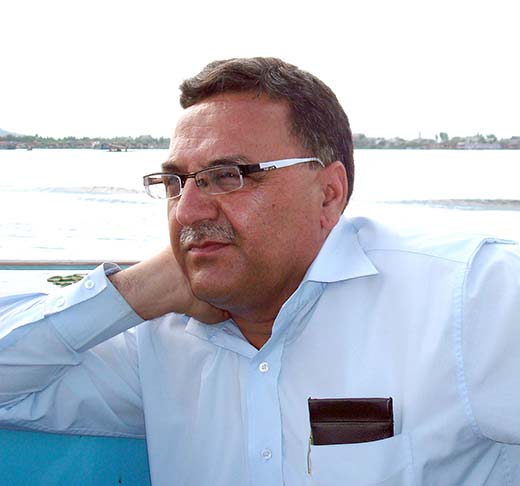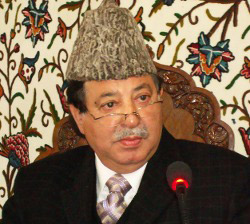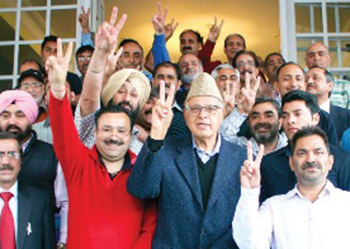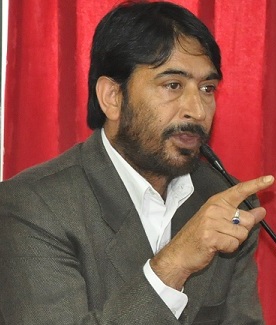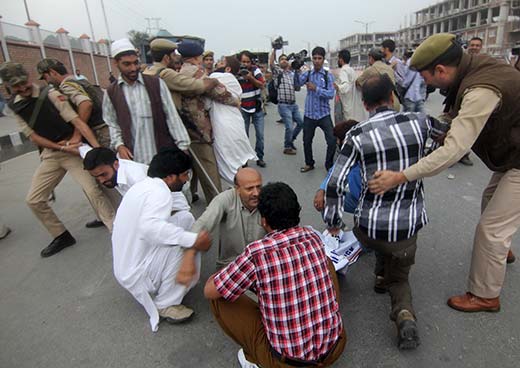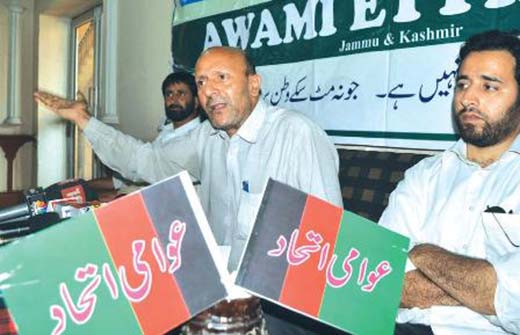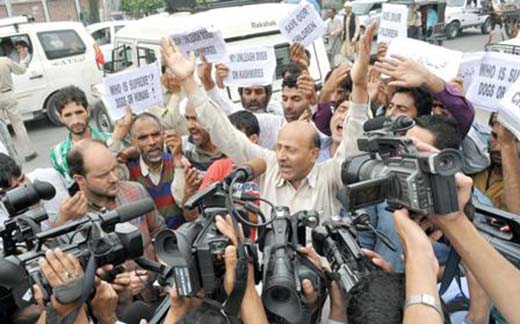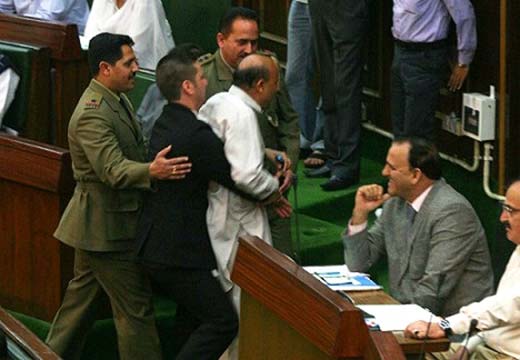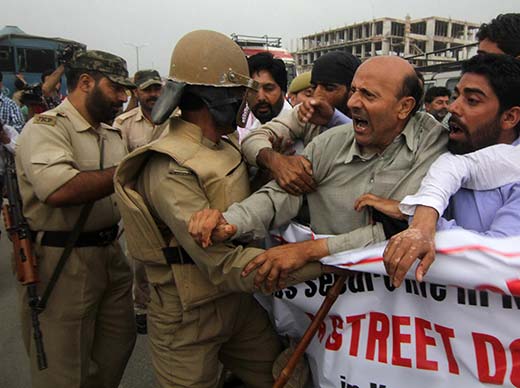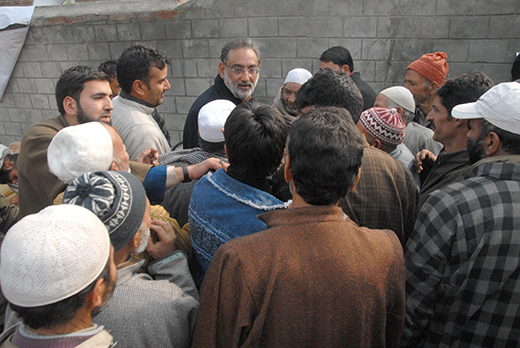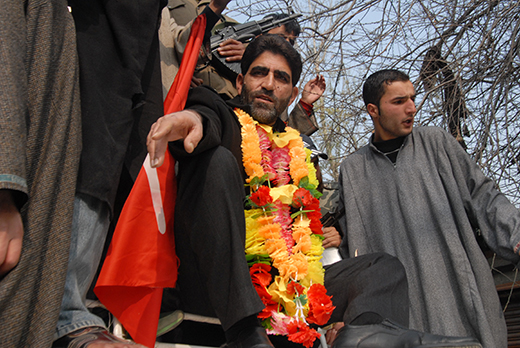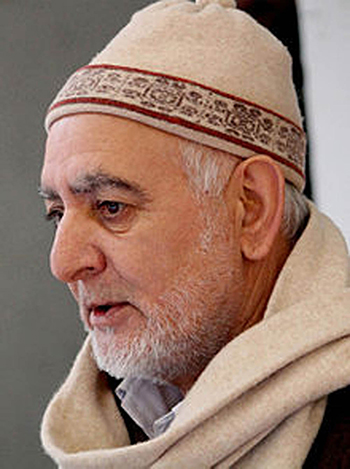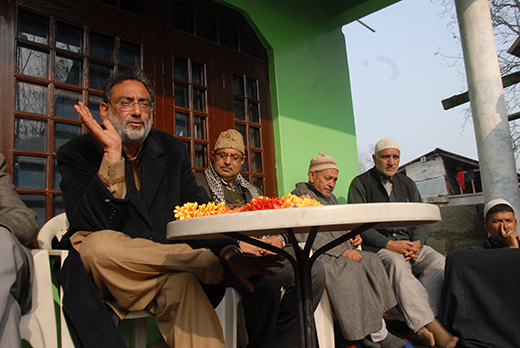Sufferings of remote Kupwara in last two decades created an ideal situation for any unconventional politician to have his debut, an opportunity that a construction engineer availed in 2008. After an eventful and hyperactive term, as engineer Rashid seeks reelection he is caught in a bitter contest with traditional parties challenging the performance he is hawking around, reports Bilal Handoo
![Er Rasheed during “secretariat gheroa” protest in Srinagar. Pic: Bilal Bahadur]()
Er Rasheed during “secretariat gheroa” protest in Srinagar.
Pic: Bilal Bahadur
A dusty Santro car (that desperately needs service to patch up its loose parts) starts moving from Srinagar to Langate. A man inside is busy with his cheap cellphone with faded digits apparently due to overuse. Clad in pheran and wearing weathered footwear, the man is frequently answering phone calls. On the driver’s seat is his personnel assistant with whom the man is exchanging occasional puns. As the vehicle is catching up some speed, both din and imbalance become loud inside.
In between, the phone rings, again. The caller is informing the man about the fresh FIR registered by police against his relative in Wattergam. “Alright, don’t panic. Just give me the local SHO’s cell number,” with that, the call ends. Now he is dialling the SHO’s number. He can hear the bell. The receiver answers, “Hello?” The man speaks, “Hello, this is MLA Langate speaking…” The man inside is the ‘firebrand’ lawmaker of Langate, Abdul Rasheed Sheikh aka Er Rasheed who is on way home.
“Jenab, how wise is this to register FIR on a petty issue?” Er Rasheed asks the SHO. “Look, I know the argument you have under your sleeve. I too know the law—that gives deviant a chance to correct himself. But you make it sure to charge a person on a very first go! You should at least consider somebody’s reputation. Not everyone you charge is criminal. Alright, listen up, just withdraw his charge and give him a chance to correct himself.” The SHO promises the same; and in a flash, Er Rasheed ends the call.
With irked face, MLA Langate turns towards his assistant-cum-driver and questions the police action: “Is this a way to handle a minor issue like a scuffle?” He is fuming—he grits his teeth, contracts his small eyes in bony orbits, bites his lower lip and flashes ire on face. (Perhaps behind his madness is a method: no PSA has been slapped on youth of his constituency after he became MLA.)
Amid honks and buzz on highway, his cellphone rings again. This time the caller is a local from his constituency expressing anguish over irate power supply schedule in his area. As the call ends, Er Rasheed dials the number of the executive engineer power department. “Look I need the power schedule of my entire area within two days,” he says. “If I don’t get it, remember on third day I would be protesting in front of your office!” Without waiting for assurance, he ends the call in disgust.
Scores of such calls follow on his way to home.
As the vehicle enters his constituency, some cops busy frisking civilians mellow down their ‘tight and tough’ body language. The vehicle halts; a cop-in-charge swiftly runs forward flashing a suppressed smile. “While you frisk, make it sure not to put people at any inconvenience,” he tells the cop before cueing his driver to resume journey.
A five minute later, his vibrating vehicle enters Marattgam, the village torched by Ikhwanis in 1995. Hardly five years ago there used to be a ‘dreadful’ army garrison at the entry point of this village, which is now in ruins. It was Er Rasheed who protested aggressively against the army garrison after becoming MLA and eventually forced army to vacate it. Similarly, he managed to relocate two other army camps from his constituency —something which no other MLA did before in Langate with a history of strong militancy and heightened militarization.
The vehicle plying on blacktopped roads passes through a tourist resort, one of the main attractions of Langate constructed during Er Rasheed’s stint as legislator. The road still under construction is expected to connect last villages close to LoC.
Near a cluster of households under the grip of fall and chill, the vehicle halts. As he steps out, he enters inside a house along with horde. He sits at the corner of the room on ground floor. A man with long flowing jet black beard rises up to speak: “People of Langate are thankful to Er Rasheed Sahab who restored a sense of calm and confidence in us.” While everybody inside the room nods their heads, Er Rasheed with lowered head is busy with his cellphone. “He suffered greatly and left his engineering job for our sake…”
Born in the Sheikh family of Mawer (Langate) on August 19, 1967, Er Rasheed is the elder son of a retired teacher. He studied up to class 10 (1983) in Mawer, completed his class 12 (as science student) from Govt higher secondary school Handwara before graduating in science from Govt degree college Sopore. Later he completed three-year diploma in civil engineering from Govt polytechnic in 1991.
Two years later on September 27, 1993, he was appointed as assistant manager (equivalent to junior engineer) in J&K Projects Construction Corporation (JKPCC)—a semi government construction corporation. “His integrity and honesty as an engineer stand out in the department,” says Parvaiz Ali, a local in Langate. “During his 16 years of service, he maintained a clean image without facing any charge of corruption.” In fact, continues Ali, he would at times give his whole salary to destitutes and orphans.
But personally the period between 1990 and 1993 was the worst for him. “During those years, I was subjected to 400 days of army’s bonded labour—the modern day begear,” he says. “The army would force me and others to clean and fill their vehicle with petrol. It was humiliating period to say the least.” Besides he had to bear the brunt when army would frequently turn his residence into a makeshift camp by locking down his whole family inside one room.
When he couldn’t take it anymore, he put up a volte-face for the first time against the army excesses in 1993. Two years later in the summer of 1995, he was severely beaten (and eventually hospitalized for three weeks in Srinagar’s Bone & Joints Hospital) by some unidentified gunmen after refusing them cement from the site of an under-construction bridge in his area.
But this didn’t affect his professional duty. By 1998, he was promoted to deputy manager in JKPCC. A year later, he married without throwing any ceremony or celebration. “I spent just Rs 50 on my marriage,” says Er Rasheed, now father of 3 children.
He rose to senior manager post in 2002 (equivalent to assistant engineer). He was to get promotion as deputy general manager (equivalent to executive engineer), but resigned to fight election in 2008.
![Er Rasheed and his party workers protesting in Srinagar.]()
Er Rasheed and his party workers protesting in Srinagar.
But more than his engineering, he was getting popular for his social service and for his firm stand against army excesses. On Feb 3, 2003, he led an anti-army protest demonstration of around 15000 people in his area after a youth Shabeer Ahmad Peer was killed in army custody. He remained adamant to call off the agitation until forced army to promise to stop excesses against people including forced labour (a routine in that highly militarized area).
Back home fearing army backlash, his father showed him the door. He stayed away for many weeks before reuniting with his family.
But his popularity was only growing in and around Langate. By 2004 he did what many now call “unthinkable”. He resisted government’s plan to divert water of a reservoir to other areas, which could have resulted in drought in 150 villages of Mawer area. “This incident was a landmark event in Rasheed’s popularity in the area,” believes Hamid Bhat, a resident of Mawer. However, his devotion for social service started affecting his job. With the result, he faced 5 suspensions; and his salary was withheld countless times.
In the summer of 2005, Rasheed was protesting against army excesses in his area, again. With the result, he was (for the second time) expelled from home by his father, who was wary of his constant cudgels with army. Er Rasheed had to spend more than two months outside home. This, however, didn’t damp his spirit for social service.
When earthquake hit valley in October 2005, Rasheed organized a month-long relief work (with the help of different NGOs) in the affected areas of Kupwara district. Later a prominent NGO Help Foundation handed over construction of a school to him for which he “donated more than 4 kanals of land”. Now run by Er Rasheed, this popular 6th standard school provides free education to poor and orphans. (Langate has one of the best performing schools in entire north Kashmir.)
Besides social service, he is known for his bravery. He once captured 5 leopards in his area within two months with the help of some locals, after wild life department failed to capture them. The leopards had killed and wounded many people in his area. The department literally became laughing stock when Er Rasheed captured the ferocious animals without any technical support.
However, his detractors were getting weary of his frequent protests against army, social service and rising popularity. In fact, he admits that before becoming a lawmaker, he could sense sleuths stalking him disguised as commoners. With the result, the bitter outcome was on the cards.
In the fall of 2005, Er Rasheed was arrested by SOG in Srinagar allegedly for supporting militants. “I was badly tortured,” he recalls, “and jailed for three months and 17 days.” Rasheed terms this incident as “a conspiracy” against him for his “pro-people” activities. A charge of “anti national activities” was slapped on him. “I was kept in Cargo, Humhama and Raj bagh prisons,” he says. “During my confinement in CIK, I was made to pee in a bucket meant for drinking water!” Later, he says, when I couldn’t take it anymore, “I paid Rs 1.14 lakh bribe to set myself free.” After his release, he made multiple rounds to different police stations before CJM Srinagar dropped all charges against him.
There is an interesting incident related to his detention. While in custody, he once challenged a senior cop in Raj bagh police station: “Next time I will meet you as an MLA!” It was 2005. Three years later when he won 2008 elections, he went to meet the same senior cop one day. “Tell your Sahab, Abdul Rasheed Sheikh has come to meet him,” he told the guarding cop. “Come some other day, Sahab is busy right now,” the guarding cop told him after the senior cop refused to meet him. “Just tell him, MLA Langate is waiting outside his office.” The cop went to inform the senior cop and returned quickly to tell Er Rasheed: “Sir, Sahab is waiting for you!” As Er Rasheed stepped forward, he could see the senior cop rising from his chair in respect. “Do you remember me? I have come to inform you that I have fulfilled my challenge!” With that he slammed the door and left.
![Er Rasheed addressing a press conference.]()
Er Rasheed addressing a press conference.
At Marattgam, Er Rashid is still busy with his cellphone while the bearded man is telling people: “We should rise above the boycott politics.”
“In this election,” says a former NC’s Halqa president, “I will vote for Er Rasheed for the change he swept over our lives.” Besides preventing youth of Langate from draconian PSA, he continues, “it was Er Rasheed who struggled to end inter-district recruitment policy and thus, opened up ample employment avenues for the local youth in their own district.”
Amid piling up praises, Er Rasheed looks unfazed, busy running fingers on his cellphone. Another speaker stands up to speak: “Do you people remember 2013 Eid when three army men were killed in the village?” In unison, everyone raise a ‘war cry’: “Yes, yes…” “Then you must also remember who prevented us from the wrath of army that day?” Again everyone in chorus reply: “Of course, Engineer Sahab!”
“Er Rasheed is poor man’s MLA,” asserts another, “only he deserves our votes.” Inside the room are former NC and PDP workers; besides former militants. “We don’t care how he dresses or speaks,” says a lean man with a pointed nose. “We only care about the difference he brought in our lives.” Many voices speak up in unison: “Er Rasheed is a chief minister material.” Hearing this, Er Rasheed flashes his tiny teeth apparently in surprise, spread deep smile, before blurting out: “Control your emotions!”
As the mood inside the room turns light, an elderly man starts singing: “Asi ous treomut army dehshat lou lou… Asi behtar chu engineer lou lou (We were terrorised by army… Er Rasheed is best for us).”
And when finally Er Rashid stands up to speak, he begins: “Jis khet se dehkan ko muyassar na ho rozi, Us khet ke har kosha-e-gundam ko jala do (Set the farm on fire if it doesn’t yield any crop).” In 2008, Er Rasheed had polled only 111 votes in Marattgam, “but now,” he addresses a packed room, “If you think I played any role to liberate you from police, army, middle men and bureaucratic huddles, only then I deserve your vote.”
While shifting his focus from vote politics, he reminds his captive audience how he slapped BJP MLA inside state assembly for tearing up Afzal Guru’s poster besides abusing him. “I also want to clear some airs about the reports suggesting I am on BJP’s poll radar,” he says. “The fact is: I did meet BJP’s general secretary Ram Madhav.”
For that matter, he continues, “I have no problem to meet even RSS chief and Hafiz Syed if that lead to Kashmir solution.” A buzz starts coming from his audience. He directs them to keep quiet, and continues: “So what I was saying is: when I met Madhav, I told him very openly that Er Rasheed will support BJP only on three conditions: first, resume talks with Pakistan on Kashmir issue; second, weed out corrupted officials and tainted ministers from state; and third, talk to Hizb chief Syed Salahudin.”
All buzz has stopped. Nobody is talking now. Scores of eyes are gazing his face, apparently waiting for his next words. “But you know what Madhav did? He left, saying: ‘I will first consult the party high command before taking a final call on this.’ This is what transpired between BJP and me. Now tell me, how am I sell-out?”
In the same breath, he cautions his audience: “You may say or believe that I am winning but do you have any idea how much money is being pumped in state to affect the poll results.”
![Er Rasheed in front of cameras]()
Er Rasheed in front of cameras
Known as “do it now” MLA, Er Rasheed moves without security cover and has given up his official bullet-proof car. Mostly dressed in traditional khan dress, he often gives slip to his PSOs and visits his friends. He is the first MLA who has set a public relations office in his constituency, where there is a well-established pattern of registering peoples’ grievances and taking them with the administration.
He surrendered his security when police in his area was “harassing” youth who had participated in the 2008 Amaranth land row agitation. After his protest, government released all the arrested youth and transferred the SHO.
He once had a fierce verbal brawl at the Chotipora camp of 30 RR. He was the first MLA, who refused to accept army’s diktat of entering the electricity office (where the camp was located) without his car. “I deemed it humiliation for a public representative,” he says, “and army had to apologize for the incident.”
And soon, he started a huge protest demonstration against army atrocities and staged a night-long dharna along with hundreds of people in front of police station Handwara. “I had seen army beating a youth on a road in my area,” he says. “And when I intervened, an army man poked his gun at my chest.” The incident was widely criticized forcing chief minister Omar Abdullah to send a team of officials to talk to him. The talks resulted in a six-point agreement with army and administration, including opening up a road after facing 20 years of army closure, end of forced labour and court martial of army man who poked gun at his chest.
On another occasion, he had a scuffle with the army men (the second time) at Chotipor camp for humiliating some civilians. He lodged an FIR against army with police station Handwara. (He has filed number of FIRs against Army, perhaps the only MLA to do so.)
During Omar’s rule, he recently said, over 800 militants were killed in custody. “The PDP rule was no exception to such type of killings too,” he says. “Both Omar and Mehbooba exploit the name of militancy and Syed Salahudddin to befool gullible Kashmiris.” For him NC and PDP are “tissue papers” used and “disgraced” by New Delhi.
He doesn’t shy away to castigate New Delhi for treating Kashmiri Muslims as “second-class” citizens. “You raise serious issues at times,” Dy Speaker once told him, “but you also dilute them with your mannerism and body language.” But it was perhaps because of the same body language that helped him to pass some important resolutions in Assembly like withdrawing of all FIRs against the youth accused of stone pelting and other charges from 2008.
A proclaimed slain Abdul Gani Lone ideologue, Rasheed was known as a staunch supporter of Peoples Conference. Though a close confidant of Sajad Lone, he was the only person to oppose Sajad’s political decisions.
In 2008, Er Rasheed stunned political observers by defeating senior NC and PDP leaders Sharif Din Shariq and Muhammad Sultan Panditpuri by 210 votes. By polling 7964 votes, Er Rasheed became the only independent candidate who ever won Langate seat—otherwise NC bastion: winning 6 out of last 10 elections.
At twilight, he heads for the pro-boycott belt—Sopermazgam in Langate where he only polled 13 votes in 2008. In a shivering cold and dreadful darkness, scores have turned up inside a makeshift tent erected on a residential lawn. As he walks inside, the rush starts pouring. Cracking jokes on his way to chair, Er Rasheed light-heartedly takes a kangri from a man to warm himself.
“There was a time when only two or three people would gather for such meetings here,” says a local Sarpanch in his speech. “But now, people have turned up in droves at such odd hours battling such a harsh weather only for the man who ended our nightmare!”
“Only he had guts to end police and military raj from our lives,” speaks a former militant. “He doesn’t play a politics of victimisation.” Besides, he says, “we were like sheep before Er Rasheed made us to speak for ourselves.”
When Er Rasheed finally rises to speak, he invokes the famous couplet of a poet Majrooh Sultanpuri: “Mei Akeela hi chala tha janibi manzil magar, Log saath ate gae aur karwan banta gae (I had set for my destination alone, but people kept pouring until a caravan was formed). Amid cheers and chants, he says: “Our battle is the battle of principles.” It is the battle, he says “against New Delhi’s slavery”.
About Modi and his party’s Mission 44+, he invokes his favourite couplet (with Modi-fied touch): “Modi tere hatho mei wo lakeer nahi hai, Kashmir tere baap ki jageer nahi hai (Kashmir is neither in Modi’s stars nor his father’s legacy).
After the attack comes the anguish. He recalls his torture in police detention. “I would have never joined politics,” he asserts in a low tone, “but the day I was arrested by police and tortured in many jails, I made up my mind to fight for my and my people’s rights in state assembly.”
![Er-Rasheed being marshelled out from assembly.]()
Er-Rasheed being marshelled out from assembly.
The nature of issues raised by him in state assembly for the last six years has earned him a name “elected separatist” instead of “elected legislator”. He calls Syed Ali Geelani as his role model—“Geelani is the only Qaid-e-Inqilab who represents sentiments of Kashmiri people in real sense”.
Before the execution of parliament attack convict Afzal Guru, he moved a resolution in Legislative Assembly on September 3, 2011 seeking clemency for Afzal Guru. After hanging, he described Guru as a “martyr” and sought renaming of Srinagar’s famous Lal Chowk after him.
After army gave itself a clean chit in Pathribal fake encounter case early this year, Er Rasheed marched in Lal Chowk raising anti-India and pro-Afzal Guru slogans. To the utter surprise of even police officials, Rasheed pitched: “Tum kitnay Afzal maro gay, Har ghar say Afzal niklay ga (How many Afzal will you kill? Afzal will be born in every household).”
On world human rights day, he chanted: “Bhool Gaya Hay Hindustan, Kashmiri Bhi Hay Insaan (India has forgotten that even Kashmiris are humans).”
On January 24, 2014, he openly said Kashmiris have no reason to celebrate Indian republic day as “the real democracy in J&K is still a distinct dream”. Inside the assembly, he described Kashmir as a disputed territory and once asked the Speaker of the Assembly to “put his hand on his heart and say Kashmir is not a dispute”. He reiterated plebiscite and said if demanding it is a crime, then he will commit it billion times and even if hanged or disqualified from the membership of Legislature. On KP question, he said, “When first bullet was fired in Kashmir the major portion of Pandit community left Kashmir and virtually left the Muslim community at the mercy of guns.” He even called their leaders as fanatics.
As the clock touches 10:30 PM, he attends another residential meeting at main bazaar Langate. As he enters a narrow room, an average build man starts speaking as how he confronted army a few days back when they showed up at his residence during night. “I told them that my leader is Er Rasheed,” he proudly speaks. “Upon hearing this, the army major apologised and ran away.”
Er Rasheed who launched his own political party “Awami Ittihaad Party” in 2012 finally stands up to speak, “My rivals say I play drama by wearing pheran and shunning security,” he says. “They also say I am an agent and work for Indian agencies. I can’t stop people from speculation and speaking. Maybe, my style of politics is unnerving them. Let people judge me…”
His style of work clearly seems departure from the rest. He once broke the lock of a local ration depot and distributed ration among the locals himself. On another occasion, he distributed LPG cylinders among people himself. And after government forces smashed windowpanes in Langate for protesting against Guru’s hanging, Er Rasheed himself replaced the same from his own Trust.
But the man has his own share in controversies as well.
After Modi literally made mockery of Article 370 during his Jammu’s “Lakaar rally” last year, Er Rashid termed it as the failure for Kashmir mainstream and pro-freedom leadership. But he was told by the pro-freedom camp “not to transgress the limits”. “Rasheed is issuing the statements to remain in headlines. He is a mere MLA and he should issue statements within his limits,” Hurriyat Conference (G) chief spokesman Ayaz Akbar reprimanded him. “He is a political turncoat,” Asiya Andrabi castigated him.
During this ongoing poll season, his close rival and NC’s Langate candidate Wali Muhammad alleges Er Rasheed is “an Indian agent” and all his skirmishes with Indian army are “fixed and manoeuvred”. “He has amassed huge wealth,” alleges NC’s Wali. “Er Rasheed is an actor who knows how to stage protests to gain sympathy of the people.”
I am witness to it, Wali continues, how Er Rasheed spent three days with former RAW chief AS Dulat at Reshiwari Rest House in Nowgam Langate. “It was on the directions of former RAW chief that he (Rasheed) visited United States.” He took scores of youth, he continues, to former RAW chief “and only God knows what they discussed in closed door meetings”.
While addressing a packed room at Langate, Er Rasheed is clearing a smokescreen created by NC’s Wali. “As I said before: I can’t shut somebody’s mouth. Look it drives me crazy when I hear people talking such rubbish behind my back. Meeting someone doesn’t make you an agent! Everybody knows my worth and wealth. You see, the shoe I am wearing was recently stolen. But luckily I got it back!” He sighs in relief; his audience breaks into laughter. “My MLA progress card is out; now let people judge me.”
Unlike others, Er Rasheed isn’t campaigning for polls: “And why should I? I am not desperate for your votes. Vote for me only on the merit of my work I did as a MLA.” But yes, he continues, in case you choose me for second term, “then on the next day of poll result I will start a massive agitation in Srinagar to revoke AFSPA…” Suddenly, the light disappears from the room. It is another power cut. Someone is now lighting up a gas lamp. Er Rasheed all of a sudden blurts out: “Can you sense the importance of gas amid this darkness. That’s why you need to vote for gas cylinder (his election symbol).” A light laughter follows.
He once said that it was army and police (“who by forcing Sarpanches to participate in their Sadbhavna programmes and Iftar parties”) were “facilitating the killings”. And when Syed Salahudin figured in NIA’s “proclaimed offenders” list, Er Rasheed condemned the move saying if NIA feels Syed Salahudin has been receiving money for continuing the resistance movement “then NIA should have lodged similar cases against Gh Hassan Mir who received money from various agencies for destabilizing peace in the state”.
After Langate, he attends three more such residential gatherings. Finally at 11:30 PM he directs his personal assistant to drive home, Mewar, some 8 km from Langate. “Do you know what this area is called?” he tells me as we pass through a jungle in upper reaches of Langate. “This is called Kashmir’s tora bora!” It was in this area, he continues, “army once made me their human shield for 37 hours”.
Er Rasheed who has a sharp memory for dates, days and durations claims the recent killing of a local in Langate was a “suicide attack” on him. “I saw that young man of my village lying in the pool of blood in this area only,” he says as the vehicle passes through the absolute darkness.
He broke the army cordon around the youth whose one hand was ripped off by the blast. He went closer to youth tied with grenade. He quite bravely separated the grenade from youth’s vest and took him to hospital, but the youth succumbed to his injuries. “Was it really an attack on me? Go and ask any villager,” he suggests. In fact, a local Sarpanch and scores of villagers say the slain youth had links with two IB agents operating in Langate who took him along on fateful days for some “dirty” game, but the untimely blast “spoiled their plot”.
![Er Rasheed during protest in Srinagar]()
Er Rasheed during protest in Srinagar
Over the years as MLA, Er Rasheed has earned a reputation of a fearless speaker and remained at the centre of controversy. “I do not accept constitution of India,” he once said in assembly. This irked the then assembly speaker Akbar Lone who shot back: “He is an Indian at the time when he needs funds for his constituency.” This created uproar in the house and before staging a walkout he pointed towards NC’s Ali Mohammad Sagar and said: “One day, we will exercise the right of self determination, remember it.”
When he gets going, he never shies away to launch scathing attack on his opponents. “Tum log kafan choor ho (You are petty thieves),” he once accused NC and PDP in state legislature, “who have sucked the blood of common people.” And when VK Singh controversy gripped the assembly, he termed members as “stooges of Indian army”.
Over the logical conclusion of Dhamni rape and murder case, he asked: “Can any Indian justify how Dhamni’s honour and life are more precious than that of Aasia and Neelofar of Shopian and Tabinda Gani of Langate?” In protest he called for “Secretariat Gherao” only to face batons and water cannons. And soon he was taking a vehicle full of dogs inside Secretariat but police foiled his attempt.
After Tamil Nadu assembly decided to release killers of former Prime Minister Rajiv Gandhi, Er Rasheed demanded the same treatment from J&K assembly to release the prisoners like Dr Qasim Faktoo, Masrat Alam Bhat, Ghulam Qadir Bhat and others. He also pleaded the case of Khan Sopori and others in assembly.
At home, he is restless. At about 1:15 AM, he wants to write an article for a daily before retiring to bed. He has been writing for local publications since his student days. However, he hogged limelight in November 2003 when he wrote an open letter to Yasin Malik in weekly Chattan, criticizing Malik’s comments about people of Kupwara. Later Chattan office was reportedly attacked. He continued his regular terse political columns in Chattan, till he decided to jump into election fray in November 2008.
The next day, swarms of people have flooded his residence. After deliberating on issues, he leaves for another residential meeting in Gujjar belt of his constituency. Outside his residence, a handful of cops in civvies are vigilant. “Sahab (Er Rasheed) doesn’t like uniform,” says a fresh-faced cop from neighbouring Handwara, “that’s why we are in plain clothes.”
As he steps out, a cop from Karnah follows him only to receive command: “Stay back!” At a stone’s throw from his residence, he greets women folk with a smile and shakes hand with locals on his way before driving to a Gujjar belt at the fringe of his constituency.
As he reaches the picturesque village of Herel, a horde of people follows him uphill. On the top, a picturesque meadow is dotted with wooden huts facing deodar jungle. At the beginning, a former militant-turned-Sarpanch thanks him for reducing their electricity bill from Rs 360 to Rs 108 per month; and besides laying the roads.
“I have not come here to seek your votes,” Er Rasheed addresses locals inside an open lawn. “You have all my support, so educate your kids.”
As he concludes speaking, he swiftly walks downhill with horde of people running behind him. In an otherwise calm and heavenly place, Er Rasheed manages to stir up an uproar akin to state assembly. While disappearing behind woods, he seemingly leaves a trail of memory behind. “I am often accused by others that I frequently lose my mind,” he once poured his heart out. “But how shall I maintain my cool when like a common Kashmiri, I too have a harassed history!”
